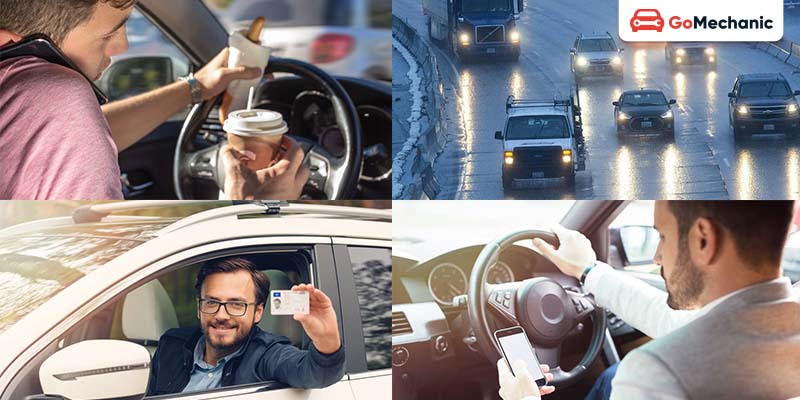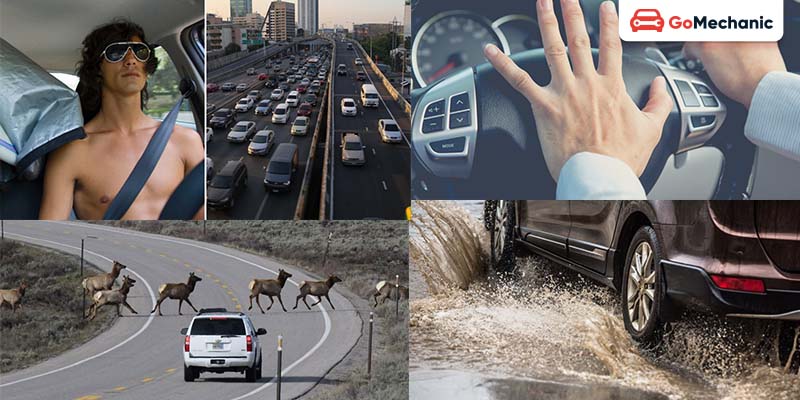Driving around the world can be an adventure in itself, but it’s the local driving laws that sometimes add an extra layer of surprise and bewilderment. From quirky regulations about what you can wear behind the wheel to where your car can legitimately drive, different countries have their unique takes on road safety and driver etiquette. Here’s a comprehensive list of some of the most peculiar driving laws from across the globe.

Thailand: No Shirt, No Drive
In Thailand, it’s illegal to drive shirtless, whether you’re in a car or on a motorcycle. This law is enforced for both aesthetics and safety, aiming to maintain a standard of decorum and prevent skin abrasions in accidents. It is enforced to maintain public decorum and protect drivers from skin injuries in the event of an accident. So, before you think about beating the tropical heat by stripping down, think again!
Cyprus: No Drinking and Snacking (Anything!)
While drinking alcohol and driving is a well-known no-no worldwide, Cyprus takes things a step further. Drivers in Cyprus are prohibited from drinking and eating anything at all while driving, including water. This law, enacted in 2017, aims to minimise driver distraction.
Spain: Glasses? Bring a Spare
In Spain, if you are a driver who requires glasses (as noted on your driving licence), you must keep a spare pair in your vehicle at all times. This law ensures that should anything happen to your primary pair, your vision – and your compliance with driving safety standards – remains uncompromised.
Denmark: Check Under Your Car for Children
In Denmark, before you start your car, it’s legally required to check under the car for children. This law may seem unusual, but it’s a safety measure intended to prevent tragic accidents involving small children who might be playing unseen behind a vehicle.
Philippines: Number Coding System
In Manila, the Number Coding System (also known as the Unified Vehicular Volume Reduction Program) restricts vehicles from being driven on certain days, based on the last digit of their licence plates, to reduce traffic congestion. This can mean leaving your car at home on certain days of the week, depending on your plate number.
Germany’s Autobahn: No Speed Limit, but…
The Autobahn in Germany is famous for its stretches with no speed limits, but that doesn’t mean you can drive as fast as you want. There are still rules to follow, including staying in the right lane unless overtaking and using your indicators when changing lanes. It is also illegal to run out of gas on the Autobahn as it’s considered preventable and a cause for unnecessary stopping, which can be dangerous.
Germany: Driving Naked is Allowed
In Germany, it is technically legal to drive naked because the car is considered a private space; however, exiting the vehicle without clothing can lead to charges of public indecency.
Russia: Dirty Cars Beware
In Russia, driving a dirty car can land you a fine. Russia takes cleanliness seriously, even when it comes to automobiles. In some cities, it’s illegal to drive a dirty car. The definition of ‘dirty’ can be subjective, but typically it means having an amount of dirt or grime on the vehicle that obscures licence plates or critical features of the car essential for safe driving.
South Africa: Animal Priorities
In South Africa, drivers must give the right of way to animals crossing the road. Failure to do so is not only considered impolite but is also illegal, as it can endanger the animals and cause accidents.
Japan: Penalties for Dirty Cars and Splash Incidents
In Japan, maintaining a clean car isn’t just a matter of aesthetics—it’s enforced by law. Drivers face fines for neglecting to keep their vehicles clean, reflecting the country’s emphasis on cleanliness and respect for communal spaces. Additionally, splashing water or mud on pedestrians while driving through puddles can result in fines, reinforcing the importance of courtesy and consideration for others on the road.
France: Breathalyzer Onboard
All drivers in France are required to have a portable breathalyser in their vehicle. This initiative aims to reduce incidents of drunk driving by encouraging self-testing as a preventive measure before starting the engine.
Sweden: Headlights on, Always
Forget the daytime running light debate. In Sweden, by law, your headlights must be on 24/7, all year round. This regulation, dating back to the 1970s, supposedly improves visibility during long stretches of twilight, especially in the Scandinavian nation’s far north.
Switzerland: Sunday Silence
In Switzerland, people really value their Sundays as a time to relax and unwind. They even have rules about keeping things quiet, like not washing cars or slamming car doors too loudly. These rules are all about respecting the day and making sure everyone can enjoy some peace and quiet.
UK: No Mobile Phone Use in Drive-Throughs
In the UK, drivers must turn off their engines and engage the handbrake before using their mobile phones, even when they’re at drive-throughs, aiming to reduce distractions and enhance safety.
No Toot-Toot in France: Horn Restrictions
While it’s common for drivers to honk their horns to alert others, in France, this could land you in hot water. Honking your horn in a built-up area without a valid reason is prohibited. So, unless it’s an emergency, keep your toots to yourself!
Conclusion
Navigating the globe’s roads involves more than knowing how to operate a vehicle; it also requires an understanding of local laws, some of which might be quite unexpected. From keeping headlights on in Sweden to avoiding mobile phone use in UK drive-throughs, these unusual laws not only reflect unique safety concerns but also cultural values and local customs. Understanding these diverse regulations can enhance road safety and ensure a more pleasant driving experience in foreign lands.






